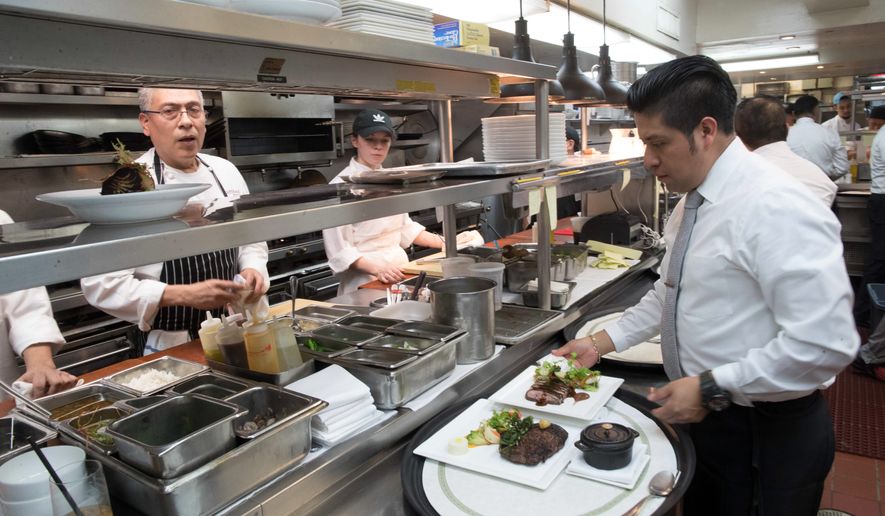Small business owners nervous about President Biden’s push to hike the minimum wage are pitching their own market-driven alternatives to a one-size-fits-all federal mandate.
Instead of an across-the-board $15 rate, business leaders are urging the administration to look at creating incentive funds and boosting salary transparency.
But the White House said Wednesday that Mr. Biden is sticking with his $15-an-hour plan despite his acknowledging that a less-dramatic increase could be less disruptive for businesses.
Carlos Gazitua, CEO of the Sergio’s Restaurant chain in Florida, suggested expanding the popular earned income tax credit or promoting additional wage transparency as a more sound approach.
“When you do a one-size-fits-all policy, everything goes up, right?” Mr. Gazitua said in an interview. “I know it makes everyone feel better to say ’Hey, let’s just do a $15 minimum wage.’ But there [are] alternatives I don’t think have been pushed or discussed.”
He said he pitched additional wage transparency for businesses in Florida but that the pandemic upended a full discussion.
“When Target increases their rates, guess what happens? Wal-Mart does — because you’re in the same business model,” he said. “So transparency wages is what I proposed as an alternative.”
Federal and state-level regulations on pay transparency are generally intended to prevent wage discrimination based on gender or race, though they also could have a side consequence of providing additional data for the market to digest and use.
House Democrats included a gradual minimum wage hike to $15 per hour by 2025 as part of Mr. Biden’s proposed $1.9 trillion coronavirus relief package. The current hourly rate is $7.25.
According to the Congressional Budget Office, the wage hike in the House plan could cost the economy 1.4 million jobs and add as much as $45 billion in annual costs to private-sector employers.
But proponents of the wage hike, including the Service Employees International Union (SEIU), stepped up their advocacy efforts to lawmakers this week, saying an increase would lift nearly 1 million people out of poverty and cut down on spending for federal safety net programs like food stamps.
“Proposals to undermine the federal minimum wage by substituting for regional wage floors would leave millions of workers out, cement low-wages in low-wage areas, and exacerbate racial inequality,” labor leaders said in a letter to Congress this month.
The letter was signed by AFL-CIO President Richard Trumka, SEIU International President Mary Kay Henry, and William Barber, co-chair of the Poor People’s Campaign.
Mr. Biden said at a CNN town hall in Wisconsin this week that small business owners’ concerns are valid, but that increasing the minimum wage to $15 per hour would boost everyone in the long run.
“Let’s say you’re going to increase the minimum wage from $7.25 an hour, between now and the year 2025, to $12 an hour, to $13,” he said. “You double someone’s pay and the impact on business would be absolutely diminished, and it would grow the [economy].”
White House press secretary Jen Psaki said Mr. Biden supports a gradual increase but that they would let the legislative process play out in Congress.
“He put it in there because he feels it’s important, it’s a priority and that men and women who are working hard, making an honest living shouldn’t be living at the poverty level,” she said.
Several Senate Democrats have balked at the proposal, which could doom the effort in the upper chamber that has a 50-50 partisan split.
Kalena Bruce of Missouri, who started an accounting business in 2009, said an employee retention credit along the lines of what lawmakers included in an earlier round of coronavirus relief is a good model to build on. She said a wage hike can’t be “one-size-fits-all.”
Ms. Bruce said that a minimum wage hike theoretically will reduce the need for federal spending on safety net programs like food stamps as people are lifted out of poverty.
“If we are going to do that and we’re going to save thousands and millions of taxpayer dollars by pulling these people off of these entitlement programs and giving them a wage increase, then we should be creating a fund with these savings to help small business owners,” she said.
The fund could be used to expand the earned income credit, which is directed toward low-to-middle income families. House Democrats’ plan already includes an expansion of the credit.
John Motta, chairman of the Coalition of Franchisee Associations, said he pays his Dunkin’ Donuts employees in New Hampshire $12 per hour. That’s the same minimum wage as in Massachusetts, which is just a short drive across the state line for workers seeking better pay.
“Doing it as quickly as the Biden administration is stating will definitely hurt businesses, will hurt jobs and will probably force some businesses to close because they just cannot compete and pay those wages at such an accelerated rate,” he said.
The House Democrats’ proposal would also bring the “youth sub-minimum wage” employers can pay to people under the age of 20 early in their employment in line with the standard minimum wage by 2027.
Mr. Motta said he likes the idea of setting up some kind of tiered system for younger employees.
“I don’t believe it’s fair that a 15, 16-year-old in high school who gets his first job at Dunkin’ should get the same $15 as a mother who is working full-time for me trying to make a living and pay for her family,” he said.
Mr. Motta and Ms. Bruce spoke to reporters Wednesday as part of an event hosted by the Job Creators Network, a pro-free market and small business advocacy group.
• David Sherfinski can be reached at dsherfinski@washingtontimes.com.




Please read our comment policy before commenting.